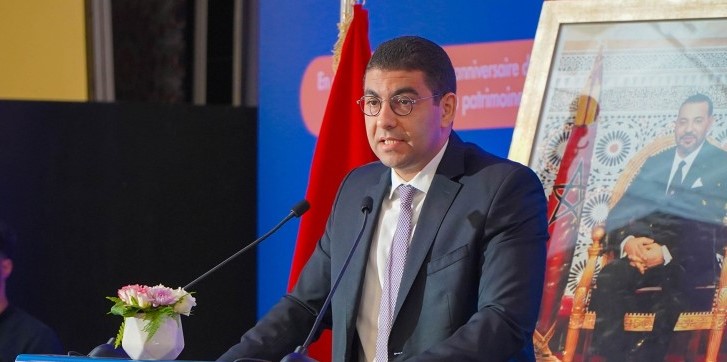Rabat Symposium Spotlights Urgent Need to Safeguard Cultural Heritage Amidst Global Turmoil
In an era marked by escalating international conflicts, the protection of cultural heritage has emerged as a pressing global concern. Addressing this critical issue, Morocco's National Commission on International Humanitarian Law convened a high-profile symposium in Rabat, commemorating the 70th anniversary of the 1954 Hague Convention for the Protection of Cultural Property in the Event of Armed Conflict.
The event, themed "Protection of Cultural Heritage during Humanitarian Crises and the Issue of Effectiveness," brought together a distinguished assembly of experts and policymakers to deliberate on strategies for preserving humanity's shared cultural legacy.
Among the notable attendees were Mohamed Mehdi Bensaid, Morocco's Minister of Youth, Culture, and Communication; Farida El Khamlichi, President of the National Commission on International Humanitarian Law; and Eric Falt, Director of the UNESCO Office in Morocco and UNESCO Representative for the Maghreb.

Minister Bensaid delivered a poignant address, emphasizing the unifying power of culture. "Culture unites us despite our differences," he asserted. "Yet, it is often the first victim of conflicts. Our heritage, in its tangible and intangible forms, suffers greatly from the impacts of these clashes."
Bensaid underscored the significance of the 1954 Hague Convention in providing a framework for cultural preservation amidst growing geopolitical tensions. He also highlighted Morocco's collaborative efforts with UNESCO to protect cultural heritage on both African and international fronts, including the country's active involvement in the ALIPH (International Alliance for the Protection of Heritage in Conflict Areas) initiative.

Farida El Khamlichi emphasized the symposium's role in raising awareness and promoting international humanitarian law. She reflected on Morocco's journey since joining the 1954 Hague Convention and its first protocol in 1968, along with subsequent ratifications of related international treaties.
"This symposium is a new milestone in our journey," El Khamlichi stated. "It reaffirms our commitment to protecting cultural property as a testament to the history of nations and peoples." She highlighted Morocco's numerous cultural registrations on UNESCO's World Heritage List and various initiatives aimed at preserving and enhancing its cultural heritage.

Eric Falt of UNESCO provided historical context, recalling how victors throughout history have often destroyed the cultural symbols of the vanquished. "This erasure of collective memory has been a dark facet of humanity's conflicts," he noted. Falt called for increased international collaboration to prevent further destruction of cultural heritage, emphasizing the importance of frameworks like the Hague Convention and UNESCO's role in coordinating global preservation efforts.
The 1954 Hague Convention, adopted in the aftermath of World War II and ratified by 135 countries, remains a cornerstone of international efforts to protect cultural heritage. Its preamble declares that "damage to cultural property, irrespective of the people it belongs to, means damage to the cultural heritage of all mankind."
Miguel Ángel Moratinos highlighted ongoing challenges and the need for renewed commitment. "We must revisit and reinforce our efforts to protect cultural heritage in the face of contemporary conflicts and crises," he urged. Moratinos praised Morocco's strategic role in promoting cultural understanding and cooperation, particularly through initiatives like the UN General Assembly's Resolution 328-33, aimed at combating hate speech and promoting cultural tolerance.

Christa Picquart, Director of Culture in Emergency Situations at UNESCO, presented on the organization's extensive experience in crisis preparation and response. She outlined specific efforts in the Maghreb region, where countries like Morocco, Algeria, Libya, Mauritania, and Tunisia have ratified nearly all UNESCO conventions related to cultural heritage protection. Despite this progress, challenges remain in fully implementing the 1954 Hague Convention and its protocols.
The symposium's discussions also reflected on recent acts of cultural destruction by terrorist groups, which have intensified the urgency for stronger international measures. UN Security Council Resolution 2347, adopted in 2017, condemns the unlawful destruction of cultural heritage and highlights the link between cultural erasure and prolonged conflict.
As global conflicts continue to threaten invaluable cultural assets, the Rabat symposium serves as a crucial platform for reinvigorating international efforts to protect our shared heritage. The event underscores the vital importance of preserving cultural landmarks and artifacts, not just as relics of the past, but as essential elements of our collective human identity and future.

Lire aussi
Latest News
- Ayer 13:30 World leaders congratulate Iran’s Pezeshkian on presidential election win
- Ayer 13:00 Beryl's Wrath Intensifies as Historic Hurricane Barrels Towards Texas Coast
- Ayer 12:30 Beijing's Behemoth Vessel Anchors in Philippine Waters, Raising Tensions
- Ayer 12:00 Donald Trump Disavows Project 2025 Amid Scrutiny Over Potential Second Term Agenda
- Ayer 11:30 Stormy Daniels' Supporters Rally Around Her Amid Alleged Threats
- Ayer 10:50 Wisconsin Dam Breach Prompts Evacuations, Residents Allowed to Return Home
- Ayer 10:20 France Braces for Historic Showdown Amid Polarized Campaign Trail

